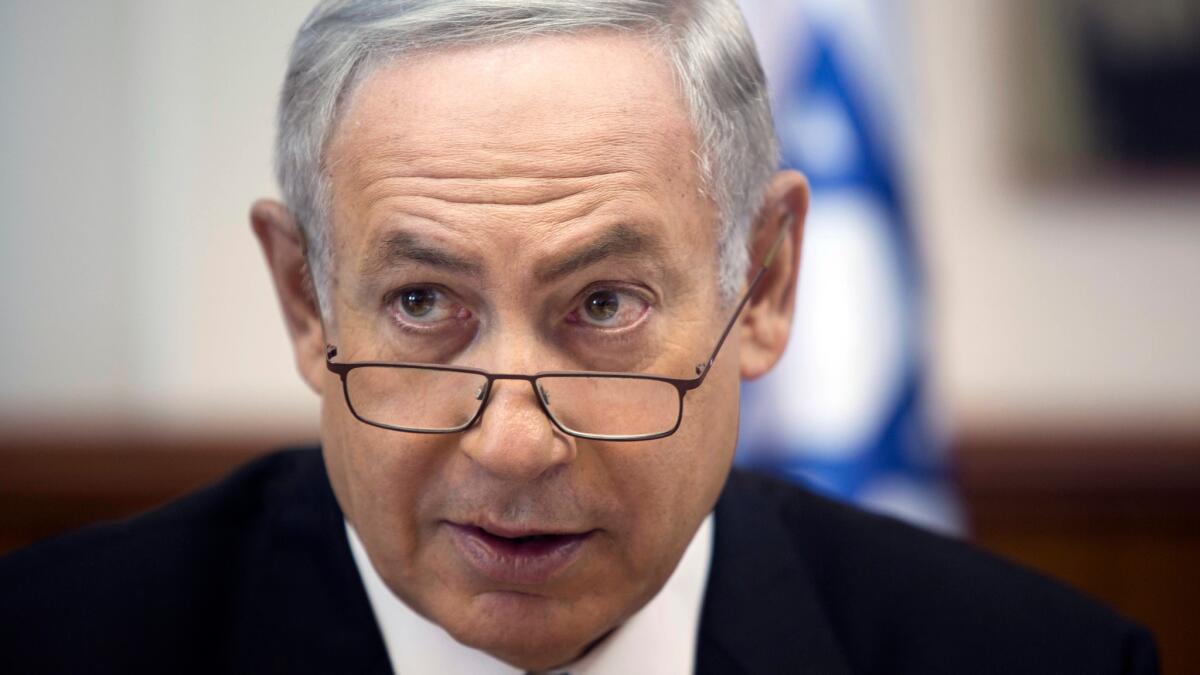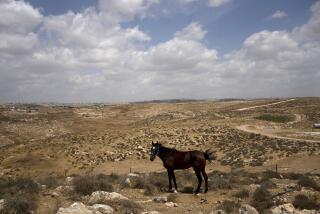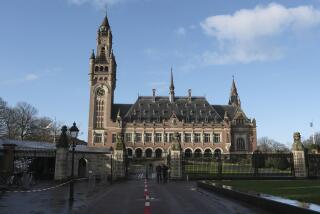Israel, U.N. exchange barbs over settlement-building and peace with Palestinians

Israeli Prime Minister Benjamin Netanyahu attends the weekly Cabinet meeting at his office in Jerusalem on Aug. 30, 2016.
Reporting from Tel Aviv â A U.N. envoyâs statement suggesting Israelâs expansion of Jewish settlements presents an obstacle to peace with Palestinians distorts history, a spokesman for Prime Minister Benjamin Netanyahu said Tuesday.
In a report to the U.N. Security Council in New York, Middle East envoy Nickolay Mladenov on Monday highlighted a âsurgeâ in Israeli plans to advance 1,700 new housing units in the occupied West Bank and East Jerusalem, and efforts to retroactively legalize hilltop settler outposts. The report also accused Israel of stepping up demolitions of Palestinian buildings, and conducting a land survey to identify grounds for a new settlement next to the Palestinian city of Bethlehem.
Palestinians want the West Bank and East Jerusalem for a future state.
âIt is difficult to read in these actions a genuine intention to work towards a viable two-state solution,ââ Mladenov, special coordinator for the Middle East peace process, said in the report. âThis appears to reinforce a policy, carried out over decades, that has enabled over half a million Israelis to settle in territory that was occupied militarily in 1967.â
David Keyes, a spokesman for Netanyahu, said Tuesday that Mladenovâs statement was âdistorting history and international lawâ and that the criticism would make peace efforts harder.
âIt is not the presence of Jews, who have lived in the West Bank and Jerusalem for thousands of years, that is a barrier to peace,ââ Keyes said in a statement. âRather, it is the unceasing efforts to deny that historical connection and a refusal to recognize that Jews are not foreign to Judea,ââ using a biblical term referring to the southern West Bank.
Keyes called criticism of Israeli building in East Jerusalem â areas of the city occupied and annexed following the 1967 Middle East War â âas absurd as saying Americans canât build in Washington or the French canât build in Paris.â
The exchange reflects the growing chasm between the international community and Israelâs government over the status of the West Bank. While the settlement building is widely considered illegal and harmful to the peace process, many ministers in Israelâs government are opposed to a Palestinian state and are increasingly calling to annex certain settlements to Israel.
Though Netanyahu says he still supports the eventual creation of a Palestinian state, many foreign leaders point to an interview on the eve of a parliamentary election in 2015 in which he said no such entity would be created if he were returned to office.
The two-year hiatus in peace negotiations and growing Palestinian efforts to pass international resolutions against Israel have fanned speculation in Israel that the U.S. may agree to a formal declaration or measure at the United Nations Security Council critical of Israel.
An advisor to Palestinian Authority President Mahmoud Abbas applauded Mladenovâs report, but said more needed to be done.
âWe need actions more than statements,ââ Husam Zomlot said in an emailed comment. âThe Security Council shouldnât continue to be paralyzed over flagrant and systematic violations of international law committed by Israel.â
The U.N. envoyâs statement comes two months after a report on the state of Israeli-Palestinian relations from the so-called Middle East quartet of peace mediators â the U.S., the United Nations, the European Union and Russia -- also took Israel to task over settlements. The report pointed to large parts of West Bank territory designated for exclusive Israeli use and said Palestinian development on most remaining open land is blocked by Israeli military bureaucracy.
The quartet said the number of Israeli settlers in the West Bank excluding East Jerusalem had tripled to 370,000 since the beginning of Israel-Palestinian peace negotiations in 1993 and slammed the settlements as eroding the viability of a Palestinian state. An additional 200,000 Israelis live in neighborhoods of Jerusalem built in areas annexed after 1967.
âThis raises the legitimate questions about Israelâs long-term intentions,ââ the report said.
A month ago, a U.S. State Department spokesman called plans to expand an Israeli neighborhood near the southern edge of East Jerusalem as âprovocative and counterproductive.ââ
Oded Revivi, a spokesman for the umbrella Israeli settlement organization the Yesha Council, said the United Nations criticism was misguided and would not change the situation.
âHalf a million Israelis arenât going anywhere, and its time the international community get used to it,â he said in an email Tuesday.
Mitnick is a special correspondent.
More to Read
Sign up for Essential California
The most important California stories and recommendations in your inbox every morning.
You may occasionally receive promotional content from the Los Angeles Times.










